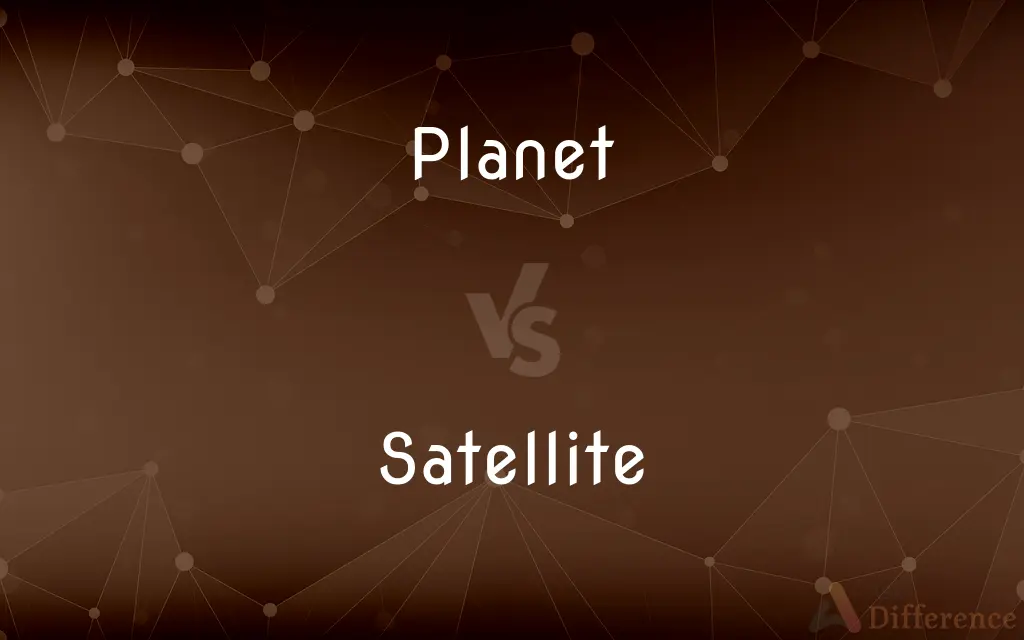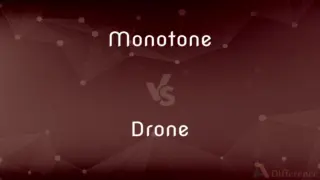Planet vs. Satellite — What's the Difference?
By Tayyaba Rehman — Updated on October 31, 2023
A planet is a celestial body orbiting a star, while a satellite is an object in orbit around a planet.

Difference Between Planet and Satellite
Table of Contents
ADVERTISEMENT
Key Differences
A planet is a large celestial body that orbits a star and is massive enough for gravity to make it nearly spherical. Satellites, on the other hand, can be either natural, like moons orbiting planets, or man-made, like spacecraft orbiting Earth.
Planets are primary bodies in the solar system with their own independent orbits around the sun. Satellites, conversely, are secondary bodies that orbit planets, reflecting the dependence on their primary body for their path through space.
The study of planets encompasses a vast array of sizes and compositions, from rocky terrestrial planets to gas giants. In contrast, satellites include diverse objects from small asteroid-like moons to sophisticated artificial satellites equipped with technology.
Unlike satellites, planets clear their orbits of other debris, a criterion used by astronomers to distinguish them from smaller bodies. Satellites, however, do not need to meet such criteria, as their defining characteristic is their orbit around a planet.
Planetary science is often concerned with the formation, geology, and potential for life on planets. Satellite research includes understanding natural satellite formation and dynamics, as well as the design and use of artificial satellites for communication, navigation, and observation.
ADVERTISEMENT
Comparison Chart
Definition
A celestial body orbiting a star.
An object orbiting a planet.
Type of Object
Primary celestial body.
Secondary celestial body or man-made object.
Independence
Orbits a star independently.
Depends on a planet for its orbit.
Size and Composition
Usually larger and diverse in composition.
Can be smaller like moons or artificial devices.
Role in Astronomy
Studied for geology, atmosphere, etc.
Studied for orbit dynamics or utility in tech.
Compare with Definitions
Planet
Celestial body
Jupiter is the largest planet in our solar system.
Satellite
Orbiting moon
The Earth's satellite, the Moon, affects our tides.
Planet
Geological entity
Scientists study planets to understand their composition and history.
Satellite
Man-made spacecraft
The satellite transmitted data back to Earth.
Planet
A planet is an astronomical body orbiting a star or stellar remnant that is massive enough to be rounded by its own gravity, is not massive enough to cause thermonuclear fusion, and – according to the International Astronomical Union but not all planetary scientists – has cleared its neighbouring region of planetesimals.The term planet is ancient, with ties to history, astrology, science, mythology, and religion. Apart from Earth itself, five planets in the Solar System are often visible to the naked eye.
Satellite
Natural body
Jupiter has over 79 satellites, including Ganymede.
Planet
A celestial body moving in an elliptical orbit round a star.
Satellite
Communication device
A satellite provides our GPS services.
Planet
In the traditional model of solar systems, a celestial body larger than an asteroid or comet, illuminated by light from a star, such as the sun, around which it revolves.
Satellite
In the context of spaceflight, a satellite is an object that has been intentionally placed into orbit. These objects are called artificial satellites to distinguish them from natural satellites such as Earth's Moon.
Planet
A celestial body that orbits the sun, has sufficient mass to assume nearly a round shape, clears out dust and debris from the neighborhood around its orbit, and is not a satellite of another planet.
Satellite
An object launched to orbit Earth or another celestial body, as a device for reflecting or relaying radio signals or for capturing images.
Planet
One of the seven celestial bodies, Mercury, Venus, the moon, the sun, Mars, Jupiter, and Saturn, visible to the naked eye and thought by ancient astronomers to revolve in the heavens about a fixed Earth and among fixed stars.
Satellite
(Astronomy) A celestial body, such as a moon, planet, comet, or other solar system body, that orbits a larger body.
Planet
The collection of life forms supported on Earth
An asteroid that threatened the whole planet.
Satellite
A small unit in a system or organization that is managed or controlled by a larger, often centrally located unit.
Planet
People as a whole; humankind or the general public
The entire planet was affected by the global recession.
Satellite
A nation dominated politically and economically by another nation.
Planet
One of the seven revolving astrological celestial bodies that in conjunction with the stars are believed to influence human affairs and personalities.
Satellite
An urban or suburban community located near a big city.
Planet
Each of the seven major bodies which move relative to the fixed stars in the night sky—the Moon, Mercury, Venus, the Sun, Mars, Jupiter and Saturn.
Satellite
One who attends a powerful dignitary; a subordinate.
Planet
(astronomy) A body which is massive enough to be in hydrostatic equilibrium (generally resulting in being an ellipsoid) but not enough to attain nuclear fusion and, in IAU usage, which directly orbits a star (or star cluster) and dominates the region of its orbit; specifically, in the case of the Solar system, the eight major bodies of Mercury, Venus, Earth, Mars, Jupiter, Saturn, Uranus, and Neptune.
Satellite
A subservient follower; a sycophant.
Planet
Construed with|en|the or}} this}}: {{synonym of Earth.
Satellite
(Genetics) A short segment of a chromosome separated from the rest by a constriction, typically associated with the formation of a nucleolus.
Planet
A celestial body which revolves about the sun in an orbit of a moderate degree of eccentricity. It is distinguished from a comet by the absence of a coma, and by having a less eccentric orbit. See Solar system.
Satellite
(Microbiology) A colony of microorganisms whose growth in culture medium is enhanced by certain substances produced by another colony in its proximity.
Planet
A star, as influencing the fate of a men.
There's some ill planet reigns.
Satellite
Of, relating to, or being a satellite.
Planet
Any of the celestial bodies (other than comets or satellites) that revolve around the sun in the solar system
Satellite
Of or relating to the transmission of electromagnetic signals by communications satellite
Satellite broadcasting.
Satellite phone.
Planet
A person who follows or serves another
Satellite
A moon or other smaller body orbiting a larger one.
The Moon is a natural satellite of the Earth.
A spent upper stage is a derelict satellite.
Planet
Spherical body
The planet Earth is an oblate spheroid.
Satellite
A man-made apparatus designed to be placed in orbit around a celestial body, generally to relay information, data etc. to Earth.
Many telecommunication satellites orbit at 36000km above the equator.
Planet
Orbiting object
Mars is the fourth planet from the Sun.
Satellite
A country, state, office, building etc. which is under the jurisdiction, influence, or domination of another body.
Planet
Independent body
Each planet in our solar system has a unique orbit.
Satellite
An attendant on an important person; a member of someone's retinue, often in a somewhat derogatory sense; a henchman.
Satellite
Satellite TV; reception of television broadcasts via services that utilize man-made satellite technology.
Do you have satellite at your house?
Satellite
(grammar) A grammatical construct that takes various forms and may encode a path of movement, a change of state, or the grammatical aspect. Examples: "a bird flew past"; "she turned on the light".
Satellite
To transmit by satellite.
Satellite
An attendant attached to a prince or other powerful person; hence, an obsequious dependent.
Satellite
A secondary planet which revolves about another planet; as, the moon is a satellite of the earth. See Solar system, under Solar.
Satellite
Situated near; accompanying; as, the satellite veins, those which accompany the arteries.
Satellite
Man-made equipment that orbits around the earth or the moon
Satellite
A person who follows or serves another
Satellite
Any celestial body orbiting around a planet or star
Satellite
Broadcast or disseminate via satellite
Satellite
Surrounding and dominated by a central authority or power;
A city and its satellite communities
Satellite
Orbital object
The satellite orbited Earth in just 90 minutes.
Common Curiosities
Are all satellites natural?
No, satellites can be natural like moons or man-made like the Hubble Space Telescope.
How many planets are in our solar system?
There are eight recognized planets in our solar system.
What's the largest satellite in our solar system?
Ganymede, a moon of Jupiter, is the largest satellite in our solar system.
How do satellites stay in orbit?
Satellites stay in orbit due to the balance of gravitational forces and their forward momentum.
Do satellites ever collide?
Yes, both natural and artificial satellites have collided in space before.
How are planets named?
Planets are named according to guidelines set by the International Astronomical Union (IAU).
Can a planet be a satellite?
Technically, planets are not considered satellites, as they orbit stars, not other planets.
Can satellites have their own satellites?
Man-made satellites cannot; however, natural satellites like moons theoretically could, but none are known.
What defines a planet?
A planet is defined by its ability to orbit a star, maintain a nearly round shape, and clear its orbit of debris.
Do all planets have satellites?
Not all; for example, Mercury and Venus do not have natural satellites.
What's the main use of artificial satellites?
Artificial satellites are used for communication, weather monitoring, navigation, and research.
What distinguishes a dwarf planet from a planet?
Dwarf planets have not cleared their orbit of other debris.
Are planets only found in our solar system?
No, planets are found around other stars throughout the universe, known as exoplanets.
Share Your Discovery

Previous Comparison
Monotone vs. Drone
Next Comparison
Meeting vs. SessionAuthor Spotlight
Written by
Tayyaba RehmanTayyaba Rehman is a distinguished writer, currently serving as a primary contributor to askdifference.com. As a researcher in semantics and etymology, Tayyaba's passion for the complexity of languages and their distinctions has found a perfect home on the platform. Tayyaba delves into the intricacies of language, distinguishing between commonly confused words and phrases, thereby providing clarity for readers worldwide.














































